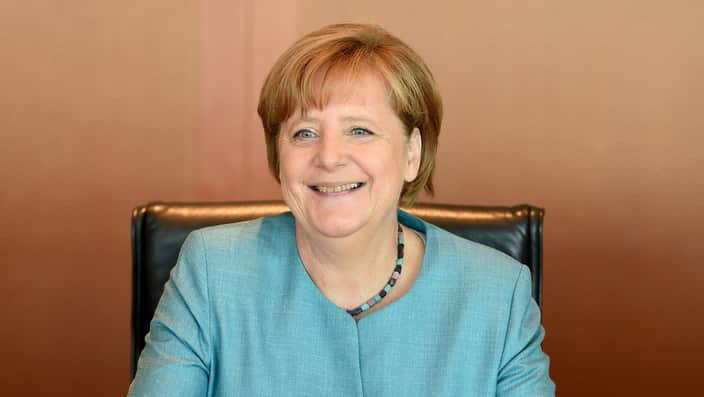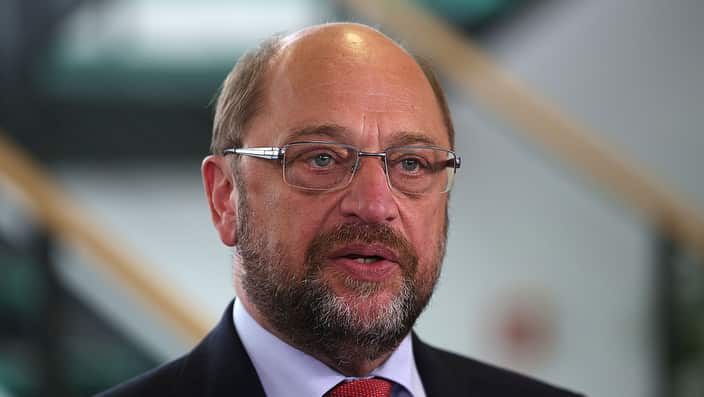After 12 years in office, Angela Merkel still manages to unite a majority of Germans behind her.
In order to understand Merkel's unique style of politics, one has to take a closer at her biography which clearly sets her apart from her all-male predecessors in Germany's most powerful office.
Merkel grew up as the daughter of a Lutheran pastor under communist rule in former East Germany. The trained physicist entered politics after the collapse of the Berlin Wall and only seized power with the smallest of margins in 2005, winning against a macho-style government run by former Social-Democrat leader Gerhard Schröder.
Since rising to power, Merkel has lead her Christian-Democrats from victory to victory on a national level
While recent elections elsewhere had been characterised by a disenchantment with established politics and the rise of energetic new faces such as Emmanuel Macron in France or Justin Trudeau in Canada, Germany seems to go its own way.
"As Germany's former Chancellor Konrad Adenauer said, Germans don't want any experiments. They favour competent politicians rather than flashy superstars" says Dr Steve Wood, a political scientist at Sydney's Macquarie University in an interview with SBS German.
"Unlike others, she's calm, efficient and a very smart politician. She gets the job done. And that's part of her success."

The Chancellor’s Christian Democrats (CSU/CDU) can expect to secure 40 per cent of the vote in parliamentary elections to take place on the 24th of September.
Werner J. Patzelt is a well-respected political expert from Dresden. He told SBS German that "Merkel might not have the charisma others bring to the table, but she scores with a sensible and likeable style. In short, there seems to be no reason not to respect her."
Nevertheless, never underestimate "Mutti", or "mum" as many call her. In her three decades in politics, the 63-year-old has walked over many dead bodies, in her own ranks as well as among politicians from the opposition.
One reason for this continuing political success is the fact that she has made herself invulnerable, says Patzelt.
"Her main secret is, she doesn´t fight battles she´s not able to win. At the same time, she accomplished the political goals of her opponents, the Social Democrats or the Greens." (Werner J. Patzelt)
By moving her party to the centre while adopting policies from the left, such as the exit from nuclear power or legalising same sex marriage, which she personally opposes, Merkel has become politically untouchable.
In recent times, Merkel implemented the end of the country´s nuclear energy as well as the introduction of same sex marriages.
Merkel has become a key player in the European Union
Despite appearing rather conservative, the Chancellor gains approval from both, older and younger German voters.
After more than a decade in office, first-time voters are yet to experience another government seem just too comfortable with the 'mother of the nation'.
Angela Merkel wins over voters by going on holidays
Merkel's main opponent, Martin Schulz from the Social Democrats (SPD), experienced a painful drop in approval ratings following a promising start.
"Getting Schulz, a former European Parliament president, on board initially seemed like a smart move," says Dr Steve Wood, "but the honeymoon period is long over."
Changing stances on key issues such as Germany's migration policy have not helped his approval ratings recently.
Schulz's SPD has been the junior partner of the grand coalition for the past four years, therefore, it is hard for him to set his own political agenda.
His party has been made responsible for many of the failures of the current government, while Merkel's party seems to reap the rewards of successful decisions.

However, experts believe that Schulz never had a real chance.
Werner J. Patzelt says, "Every candidate would have had a minimum of chances. His losses were heavy ones because of the verve he had entered the campaign with."
"The Social Democrats' problem has a name: Angela Merkel." (Werner J. Patzelt)
To date, not one political attack has inflicted damage on Merkel.
Astonishingly, her approval ratings have improved during the last weeks while holidaying in the Italian Alps and visiting cultural events in both, Bayreuth and Salzburg, while Schulz has been campaigning constantly.
Is the election battle already lost?
While a high number of voters remain undecided, experts predict Merkel a clear winner on 24 September.
"It´s been decided. The Social Democrats might make it into a new grand coalition, but with Angela Merkel as the old and new Chancellor" says Dr Wood from Sydney´s Macquarie University.
Current polls predict a clear Merkel win - with the CDU/CSU at 40 per cent, while the SPD has reached a low of 23 per cent.
Follow SBS German's special coverage of the upcoming election with weekly updates and reports from both Germany and Australia on sbs.com.au/German and facebook.com/SBSGerman
